Women fish workers are the key to fish as nutrition
Fish is a highly nutritious and prized commodity. Yet ironically, fish workers may get very little fish for themselves. Some fishing communities have less food security than the general population. Within these communities, women and infants are often more malnourished than men. Circumstances are similar in aquaculture. Agencies introducing aquaculture often assume that growers will benefit from more fish to eat. However, depending on the value of what’s grown, workers often cannot afford to eat what they produce. Innovative aquaculture projects are addressing this issue with nutrition education and polyculture -- adding small native fish species to provide local food, grown alongside those marketed for sale.
Women contribute to sustainability and healthy ecosystems
Women often have different knowledge and perspectives on resource and environmental sustainability than men. However, women are typically excluded from decision-making in fisheries management and conservation as well as aquaculture development. In certification schemes for sustainability, gender equality and women’s participation are not usually addressed even in the fishery improvement projects that often precede certification.
Some schemes are beginning to incorporate social justice criteria. Women may play important leadership roles in sustainable certified projects. Vietnam’s female-led Ben Tre clam fishery, for example, is the first fishery in Southeast Asia to receive Marine Stewardship Council (MSC) certification. Research is revealing that by including women’s voices in resource management decisions, better social and conservation outcomes are possible. Sustainable development provides opportunities for gender equality and poverty reduction. In contrast, overfishing, pollution, climate change and environmental degradation threaten gender equality, often in complex ways.
Integrating women into action on climate change and natural disasters
Studies on tsunamis, oil spills, typhoons, floods and climate change impacts reveal that women and girls experience greater casualties and disaster impacts.
Women's specialized needs are often ignored. After a serious disaster, fishermen may receive boats from aid agencies but fisherwomen often get no assistance in recovering their fishing and processing businesses. The special health and sanitation needs of women, such as their need for menstrual supplies and pregnancy support, are also often ignored. In some cultures, women and girls are not taught to swim. Women's traditional clothing can also make them less agile, compromising their survival. The result: the ability for women to recover their livelihoods is disproportionately diminished when disaster preparedness does not take gender into account

Philippines
After typhoons and floods, women are seldom consulted about their needs, nor included in rehabilitation work. Top down military responses often disadvantage women. Such responses may overlook their immediate needs and not take into account long-term rehabilitation of their fishery-related businesses. Only about half of the woman in coastal areas of the Philippines can swim, whereas most men can. That leads to higher mortality for women in the case of flooding or tsunamis. Community-based programs like mangrove replanting, which protects coastal areas, lives and property from flooding and storm damage, tend to be carried out mainly by women, probably because they generate little direct financial return on investment.

Tamil Nadu, India
Problems faced after the 2004 Indian Ocean tsunami were different between genders. Women often had to walk long distances to fetch drinking water. Many men needed to leave their local areas to find work. Aquaculture technology for brackish waters, developed by local researchers and transferred to women via self-help groups, helped women financially, building their confidence and their status in local management.

Zanzibar
As traditional coastal seaweed farmers facing shifting conditions due to climate change, women are trialing new seaweed farming technologies that better enable their crop to cope with heat stress.
___________________________________
Empowering women benefits households and societies
Although women cannot be expected to shoulder the whole burden of household care plus working in the catch-to consumer pathway, empowering women in fisheries and aquaculture has positive impacts like better care and education of children and more stable communities.
Social norms around gender roles play a key part in whether women are enabled or constrained in realizing their potential, supporting their households, and contributing to social cohesion. Groupings like women, men, youth, and children are more than just descriptions. These categories interact with factors like race, class, and ability and they affect the quality of people’s lives and opportunities.
Women, especially those living in poverty, usually cannot access the same financial, skill building and business opportunities as men. They have fewer options for their livelihoods. Women's work in the fisheries production pathway can expose them to health and safety risks like exposure to cold, wet, repetitive work in factories, and the fish-for-sex trade. When men and women need to migrate for fisheries or aquaculture work, that places extra stresses on households and communities.
Community perceptions of the role of women in society, work and their households must shift to achieve female empowerment and end their victimization by violence.

Lake Victoria, Africa
The practice of fish-for-sex in fishing hubs has created hotspots for HIV/AIDS and the spread of other sexually transmitted infections. Outreach efforts are underway to engage women traders in business, health, and education. The aim is that empowerment will provide alternative options, replacing sex-for-fish as a survival mechanism. Similar challenges exist in parts of Asia and South America.

Zanzibar
Shell-handicraft has been introduced as an alternative to low-earning seaweed farming for women. This has improved women’s access to infrastructure like houses, cellphones and electricity, plus broadened their knowledge of marketing and entrepreneurship. It has also improved social cohesion through greater inclusion of women in household and community decision-making. Despite these improvements, most of the decisions are still made by men

Philippines
A lack of education and training in managing finances mean that women are often left out of development, budgeting and decision-making, or sometimes make poor ‘investment’ decisions. For example, when fishermen are away at sea, their wives sometimes gamble the household’s money, leading to further impoverishment and debts.
_________________________________________________






